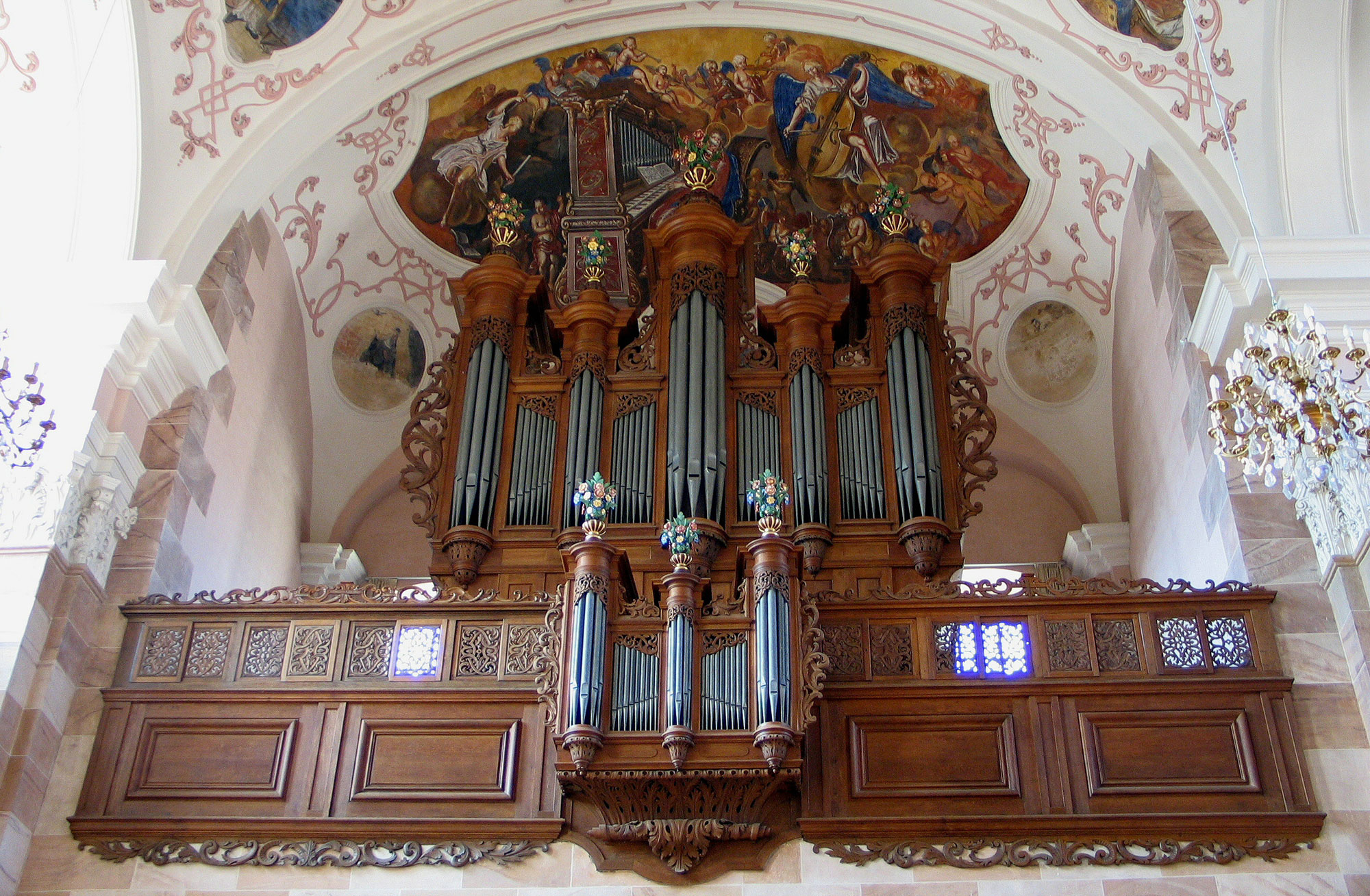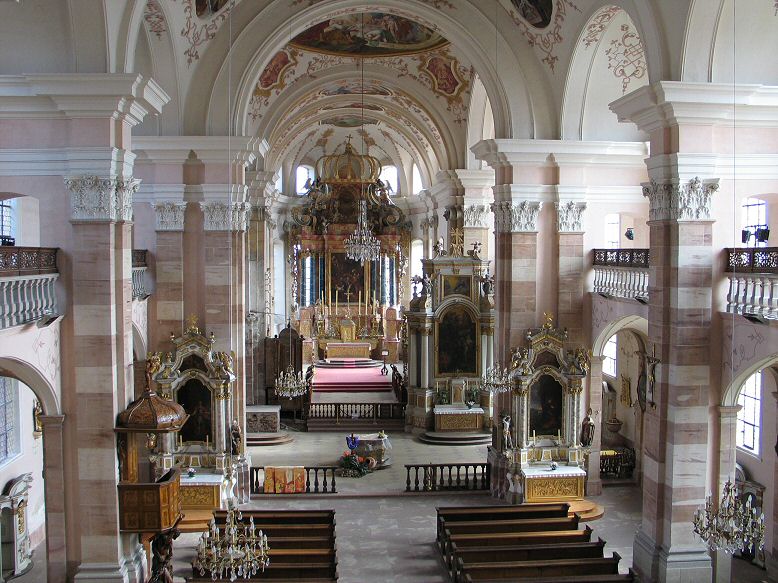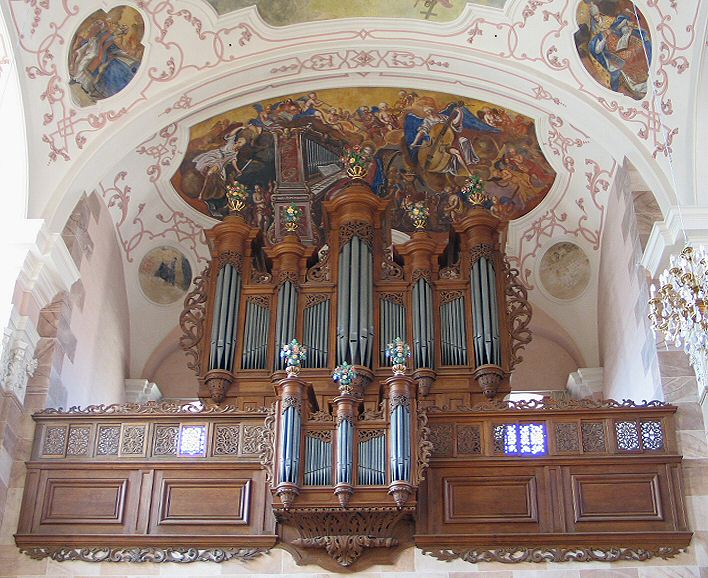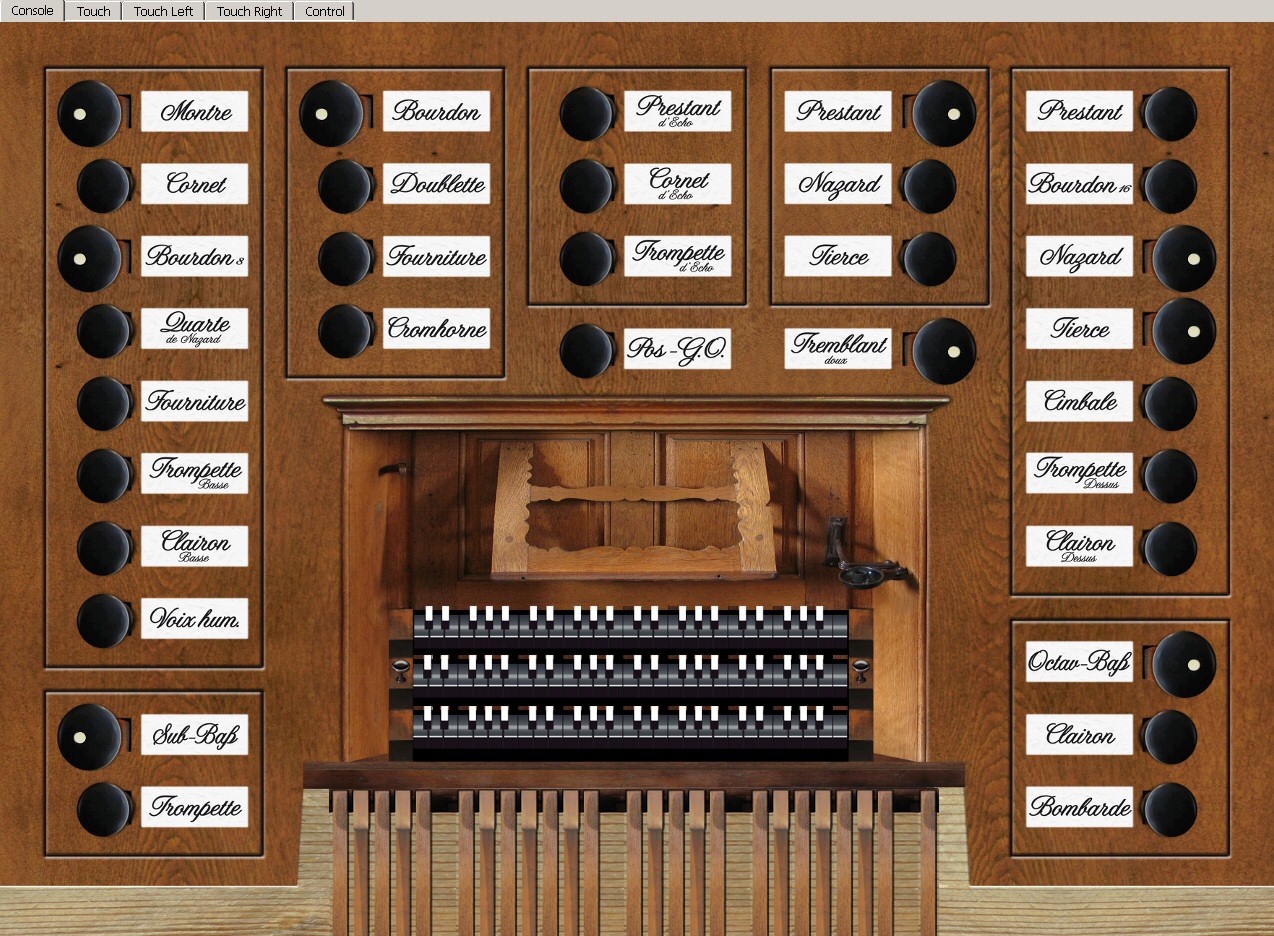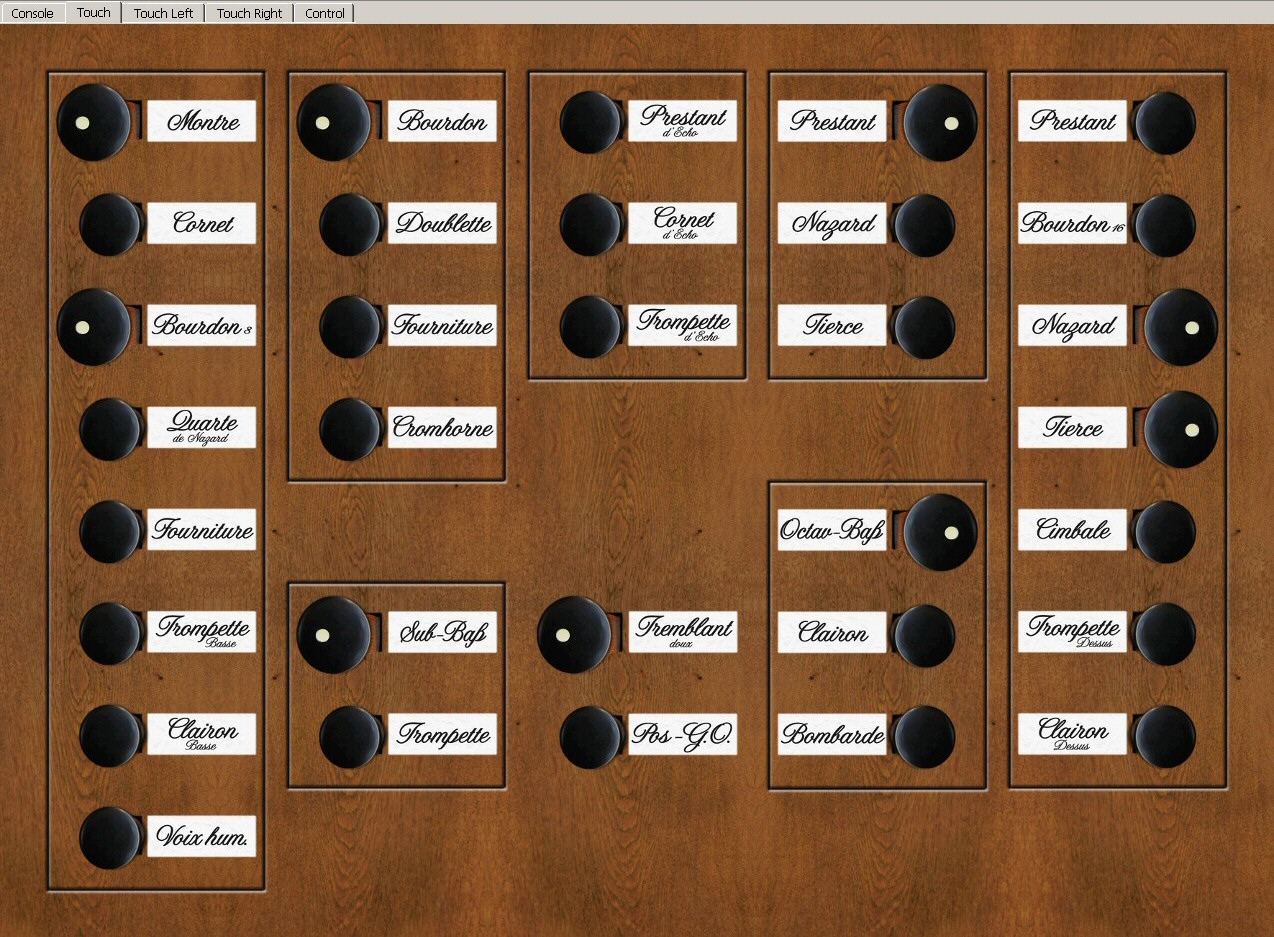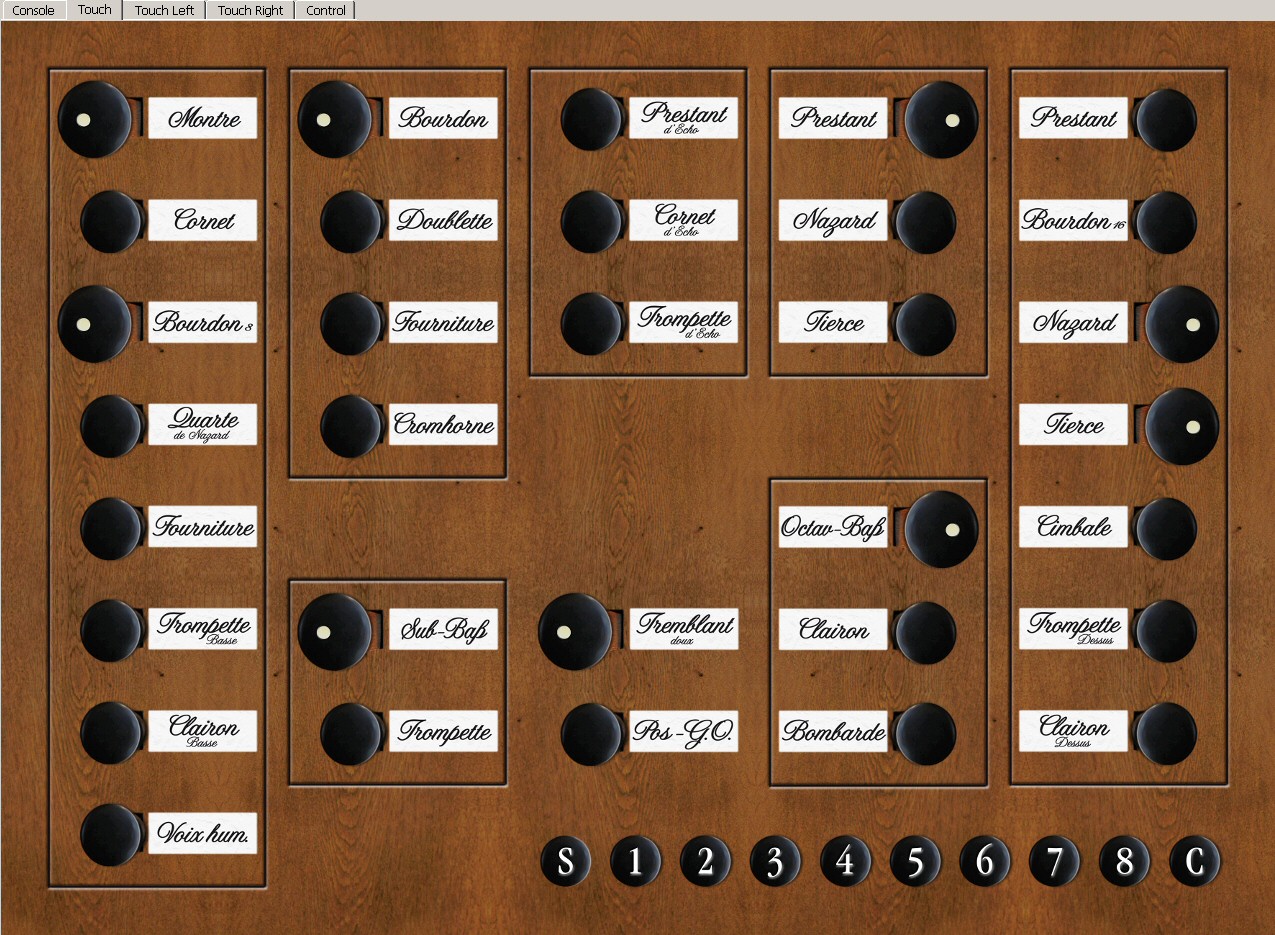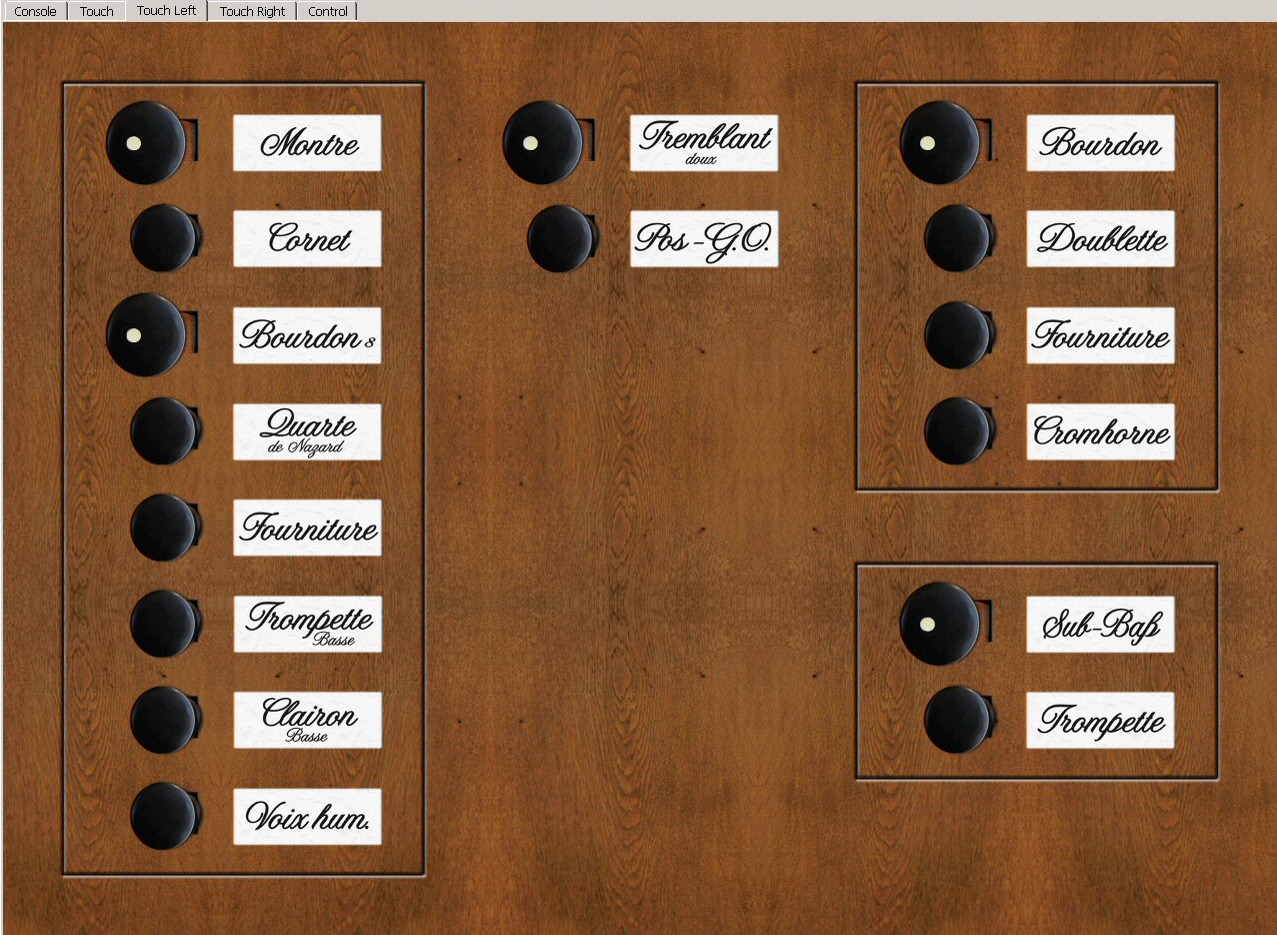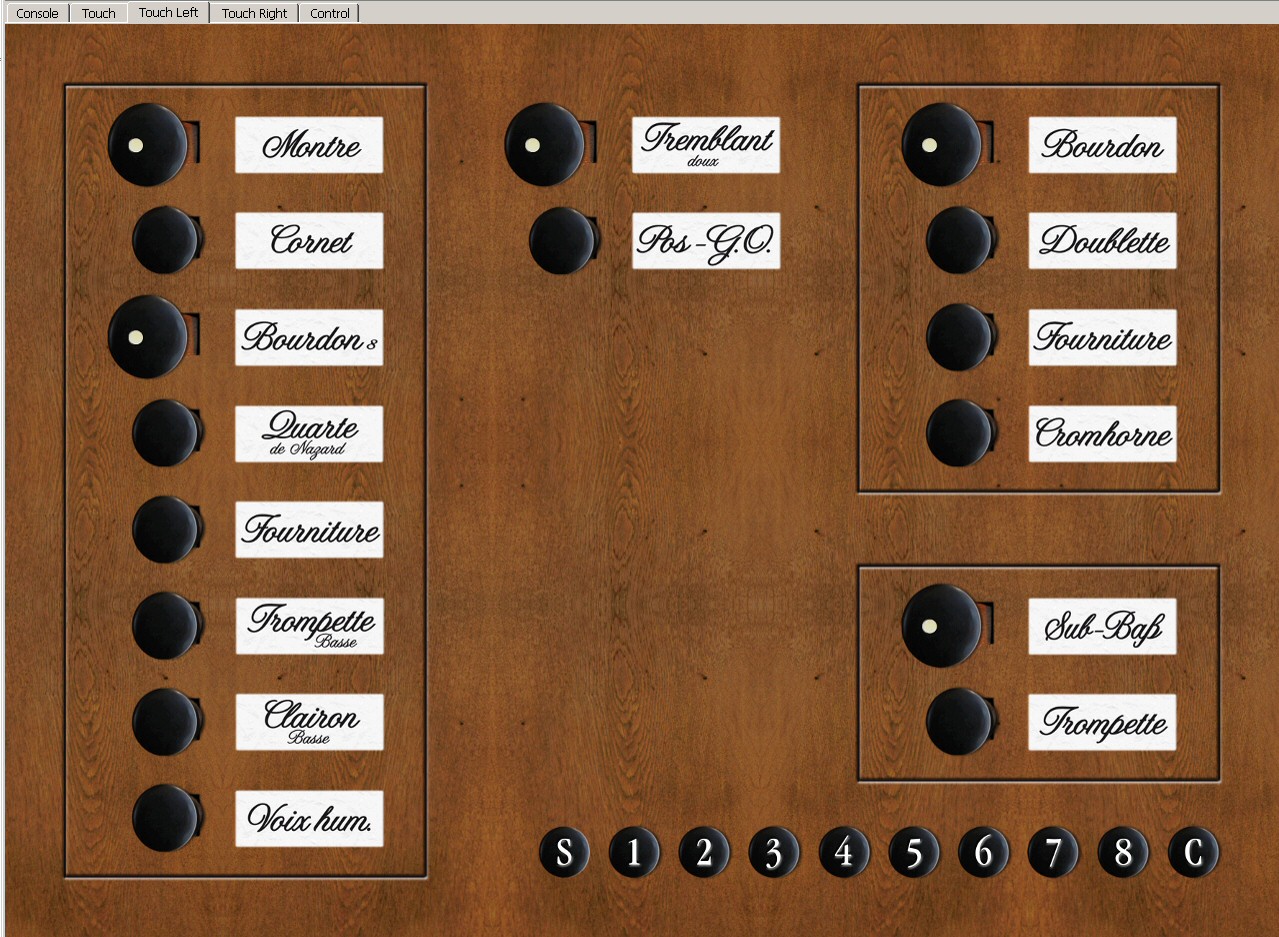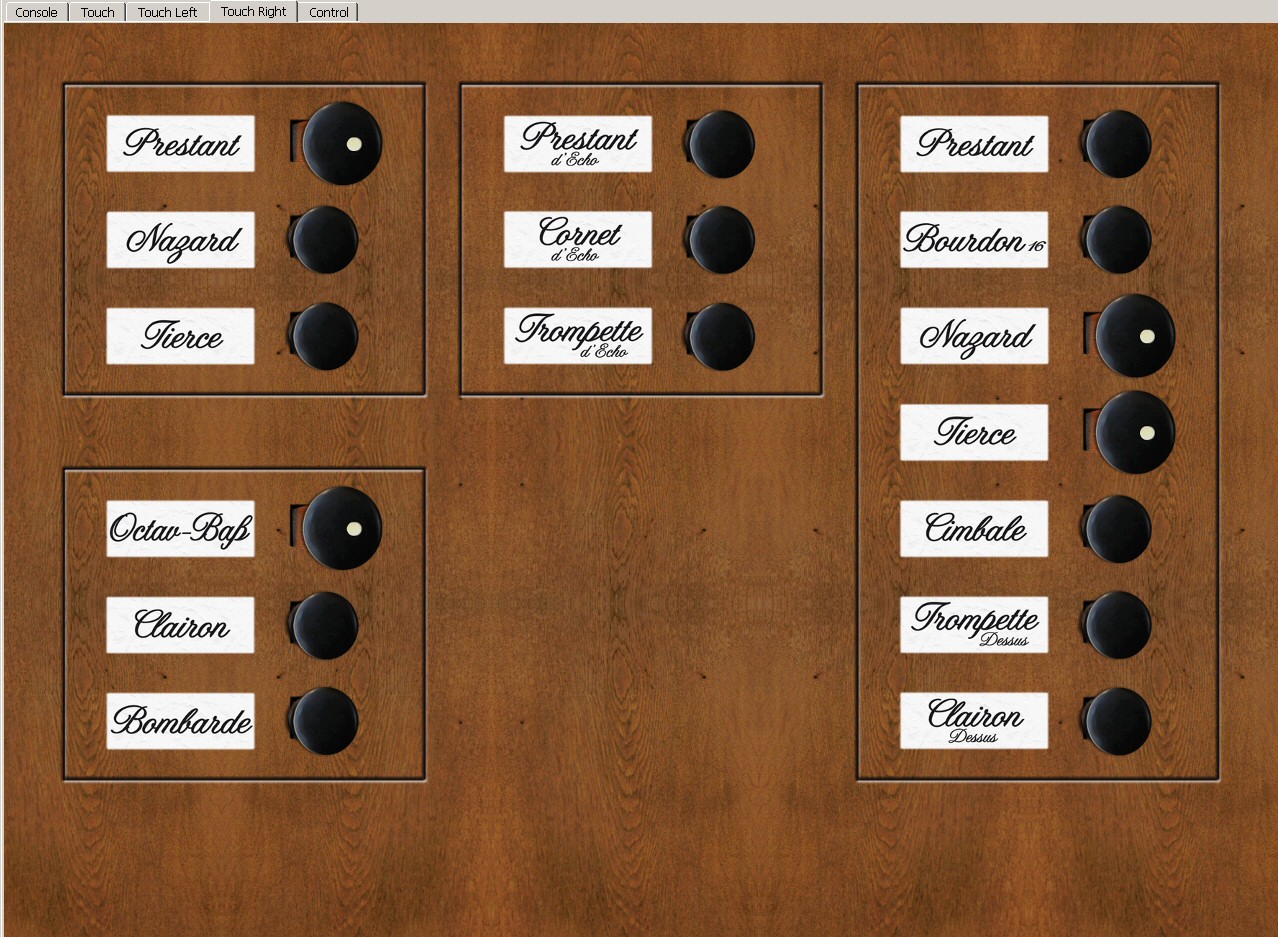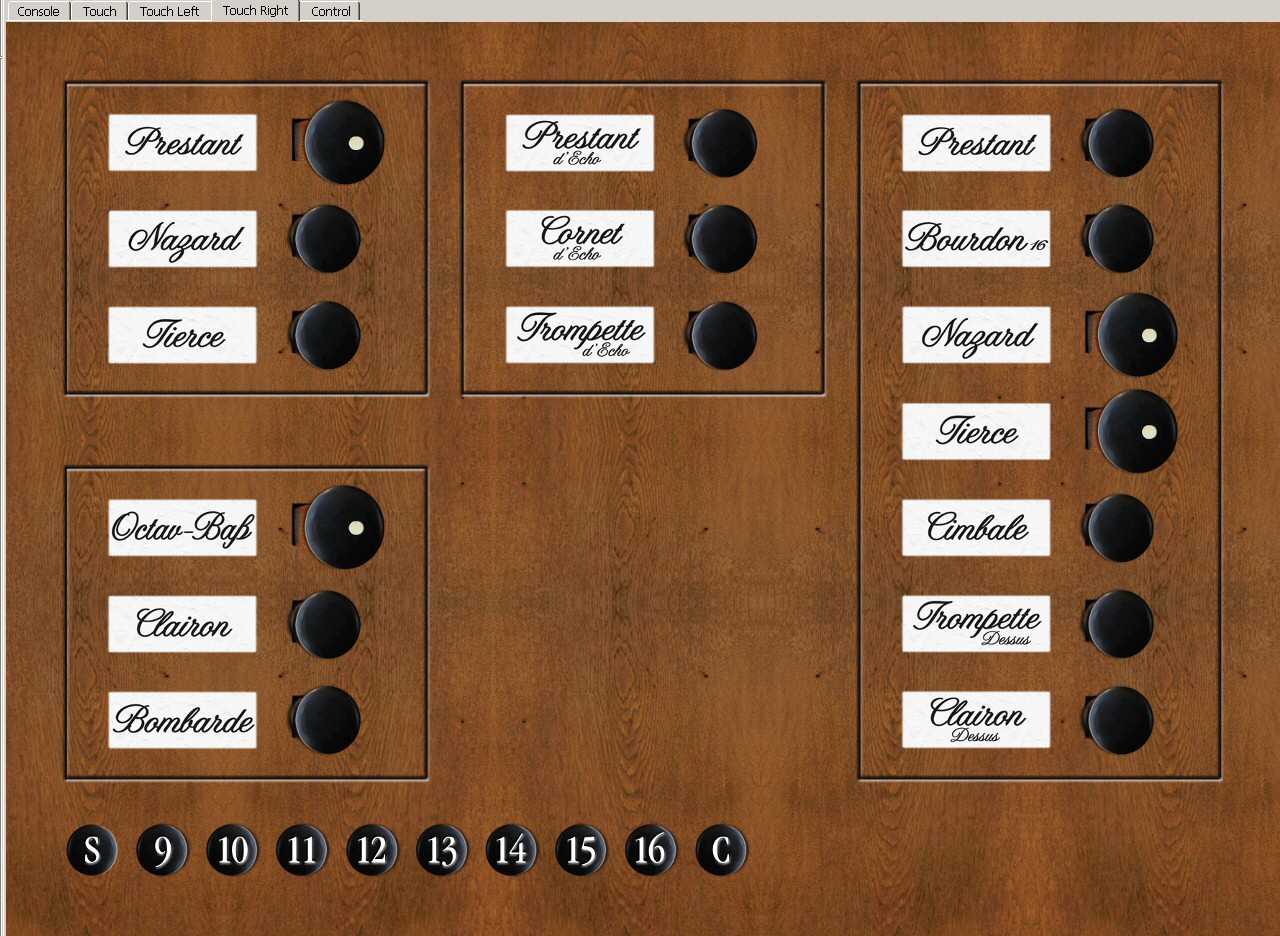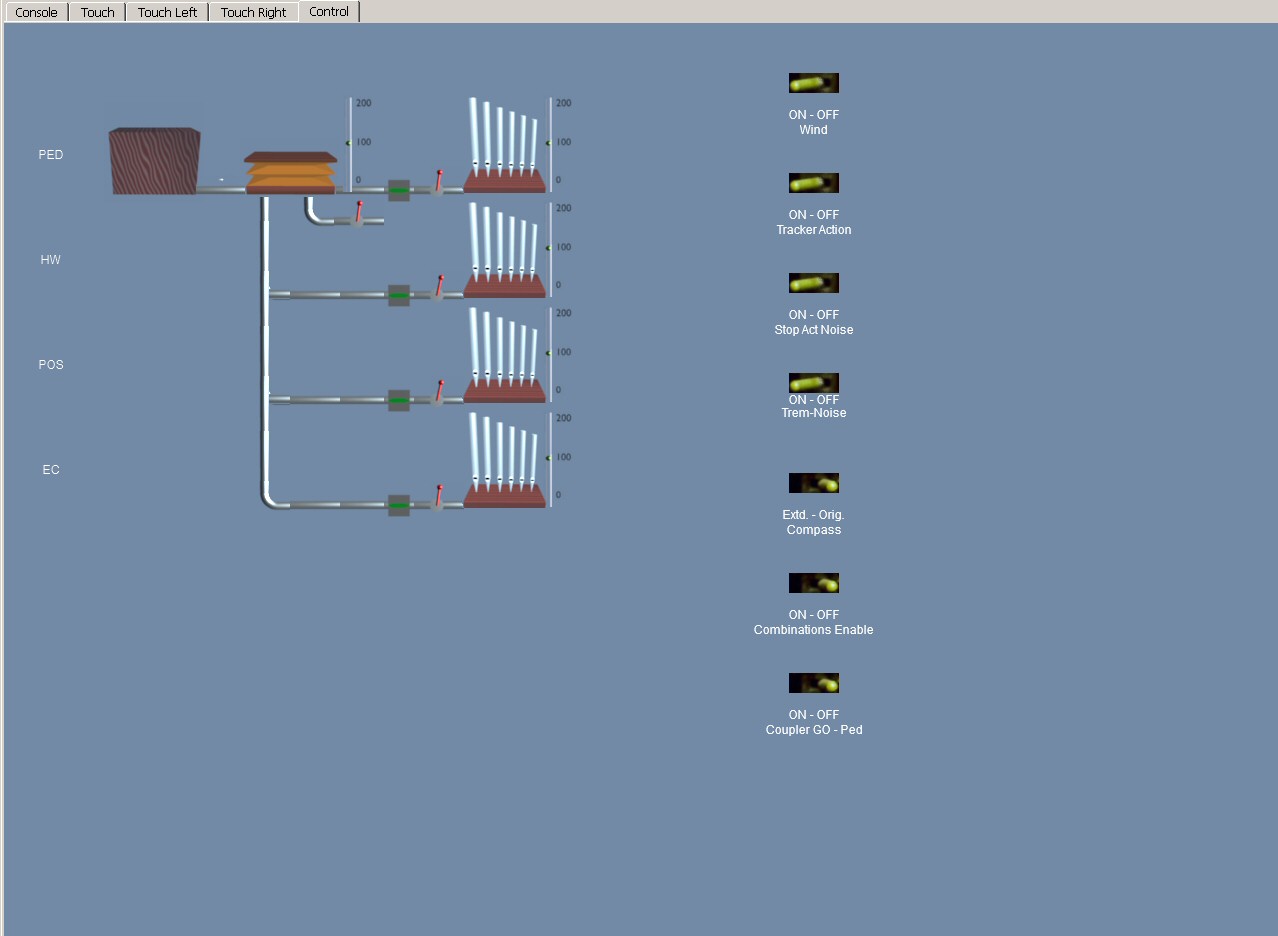1732 Andreas Silbermann Organ
Église Abbatiale St. Maurice, Ebersmunster, Alsace/France
Classified historic monument (Organ case, gallery + instrument)
Short Preliminary Introduction and History
The church reconstruction and expansion from 1709 to 1727 - after the devastation of the Thirty Years War - is the work of the famous Baroque architect Peter Thumb of Vorarlberg. The present organ loft between the two main towers was built by him in 1725.
The Silbermann organ of 1732 - one of his last works of a total of 34 - is largely preserved in its original condition.
This famous Alsacian organ in a great acoustics is one of the only two still existing authentic Andreas Silbermann organs, which have survived the decades. It's a wonder that the instrument survived the French Revolution and all wars. The organ and the complete organ gallery were entered into the Heritage Trust in 1971/72.
The instrument with its three manuals and 29 stops is based on French organ building principles with Plein Jeu, Jeu de tierce and Grand Jeu. The pedal has, in contrast to the tenor function of period French pedal divisions with pedal stubs, a full compass and a Soubasse ouvert 16 stop behind the organ casework.
This later work has wider scales and softer sounds than its previous instruments. Exceptional are the quality and beauty of the sound of the Cornet and Flûtes. The unusual Quarte de Nazard stop of the Grand Orgue allows sonorous foundation registrations. Silbermann has created a French Baroque organ type with a "Southern German accent." These sound characteristics make it possible to play not only French but also other European baroque music.
After the restoration of 1997-98, the instrument is considered one of the most valuable organs of this period in Europe.
The church room has a wet acoustics with up to 5,5 seconds of reverberation.
See Location in Googlemaps
Recording technique
The organ was recorded in June 2009 with 48 kHz, 24 bit, multi-channel for Hauptwerk 3, using the multi-release technique introduced by OrganArt. The stops were recorded with multiple release levels for short, medium and long key attacks for optimal acoustical mapping. All ranks were additionally recorded with the original tremulant sound.
Thanks
Special thanks are due to the Association des Amis de l'eglise abbatiale d'Ebersmunster, represented by M. Keller and titular organist Bernard Chalté for local assistance and support. Last but not least special thanks to my wife, who assisted the project and was responsible for the photo documentation.
Virtual Console
Specification
Organ Temperament: Slightly unequal temperament, a1= 392 Hz ("French tone")
I Positif de dos (C–c3)*01. Bourdon 8 II Grand Orgue (C–c3)*01. Bourdon 16 |
III Echo (c1–c3)*01. Bourdon 8 (perm.) Pedale (C–c1)*01. Soubasse ouvert 16 |
Couplers*POS-G.O. (Shift Coupler) Registration AidsTremblant douce * Extd. Version: |
All pipes original by Andreas Silbermann, except
1) In part supplemented by Bergäntzel 1812
2) Wetzel (?) 1858
Blower System
Three one-fold wedge bellows (Wetzel 1857), operated manually or automatically
Wind pressure: 79 mm
Requirements
Loaded Version |
Memory Requirements 3) |
Processor Speed 2) |
|
16-bit, compressed1), all loops |
3600 MB |
≥ 2 GHz DualCore |
|
20-bit, compressed, all loops |
5600 MB |
≥ 2 GHz DualCore |
|
24-bit, compressed, all loops |
6700 MB |
≥ 2 GHz DualCore |
1) Lossless compression (no loss of sound quality!)
2) Minimal configuration: Dual-Core, 4 GByte RAM
Optimal configuration: QuadCore, 8 GByte RAM
3) To load this organ into Hauptwerk you will need enough free memory in your computer, due to the amount of playable stops, not including the operating system or any other programs that may be running!
We recommend a professional audio card (e.g. RME-Series) and a studio headphone (e.g. AKG Reference Headphone K701, K712) for optimal sound and room impression.
Demos
The following demo pieces were recorded with the Hauptwerk Advanced Edition software and the virtual organ set, with no additional effects processing
Live recordings by Anton Doornhein, NL:
Jean-François Dandrieu (~1682-1738)
Magnificat in g
Plein Jeu
POS: Bourdon, Prestant, Doublette, Fourniture
GO: Bourdon 16, Montre, Bourdon 8, Prestant, Quarte de Nazard, Fourniture, Cymbale, POS-GO
PED: Soubasse, Octavebasse
Duo
POS: Bourdon, Nazard, Tierce
GO: Bourdon 8, Quarte de Nazard,
Trio
POS: Bourdon, Prestant, Nazard
GO: Voix Humaine, Prestant, Tremblant douce
Basse de Cromorne
GO: Bourdon, Prestant
POS: Cromhorne
Récit de Nazard
POS: Bourdon
GO: Bourdon 8, Nazard, Tremblant douce
Dialogue sur les Grand Jeux
GO: Montre, Prestant, Quarte de Nazard, Tierce, Cornet, Trompette basse+dessus, Clairon basse+dessus
POS: Bourdon, Prestant, Doublette, Nazard, Tierce, Cromorne
PED: Soubasse, Octavebasse, Bombarde, Trompette
Jean Titelouze (~1562-1633)
Verset de L'Hymne Exsultet coelum
Jean-Philippe Rameau (1683-1764)
Musette en Rondeau
Air majestueux
J. S. Bach (1685-1750):
Sonatina from Cantata No. 106 BWV 106
Fantasia in G BWV 572
POS: Bourdon, Doublette (Part 1, 3), + Fourniture, + Prestant (Part 2)
GO: Bourdon 16, Montre, Bourdon 8, Prestant, Quarte de Nazard, Fourniture, Cymbale, POS-GO
PED: Soubasse, Octavebasse, + Trompette (Part 2), - Trompette (Part 3)
________________________________________________________
Live recordings by Jean-Philippe Rochefort, F:
François Couperin (1668-1733)
Messe à l'usage des Couvents
- 5° verset du Kyrie Dialogue entre la Trompette du Grand Clavier et la Montre, le Bourdon et le Nazard du Positif
- 5° verset du Gloria Cromorne sur la Taille
Messe à l'usage des Paroisses
- 3° verset du Kyrie Récit de Cromorne
- 3° verset du Gloria Duo sur les Tierces
Messe à l'usage des Paroisses- 4° verset du Gloria
- Dialogue entre la Trompette, le Clairon et les Tierces du Grand Clavier,
et le Bourdon avec le Larigot du Positif
Messe à l'usage des Paroisses- 8° verset du Gloria
Dialogue en trio du Cornet et de la Tierce
Messe à l'usage des Paroisses- 9° verset du Gloria
Dialogue sur les Grands Jeux
J. S. Bach (1685-1750):
O Mensch, bewein dein Sünde groß BWV 622
Schmücke Dich, Du liebe Seele BWV 654
Präludium h-moll BWV 544
Trio-Sonate d-moll (1st movement) BWV 527,1
Numerous other live recordings can be found on the ConcertHall Website
(Advanced Search, Organ: OAM - 1732 Andreas Silbermann Organ)
© OrganArt Media, all rights reserved
No demo sounds may be used or transmitted in any form for public purposes without the prior written permission of the publisher!
Informations, Discography and Weblinks
Video about the architecture and art work of the Ebersmunster abbey (in French)
Sietze de Vries improvising Psalm 100
CD-Productions (Selection):
L'Orgue Silbermann d'Ebersmunster
Bernard Chalté, Titulair
(Correte, Nivers) Organ before restoration!
Pamina SPM 513 306 800, 1988
J.S. Bach - Das Orgelwerk an Silbermann-Orgeln im Elsass, Vol. 2
Marc Baumann
organ ORG 7214.2, 2005
Purcell, Böhm, de Grigny, Blow, Bach
Mario Hospach-Martini
OEHMS Classics OC 553, 2005
Georg Muffat, Apparatus musico-organisticus, aus "Süddeutsche Orgelmeister", Vol. 2
Joseph Kelemen, Silbermann-Orgel, Ebersmünster, Freundt-Orgel Klosterneuburg
OEHMS Classics OC 604, 2005
Historische Orgeln in Frankreich, Vol. 3
Albert Bolliger, Andreas Silbermann-Orgel, Ebersmünster
sinus 3003, 2007

